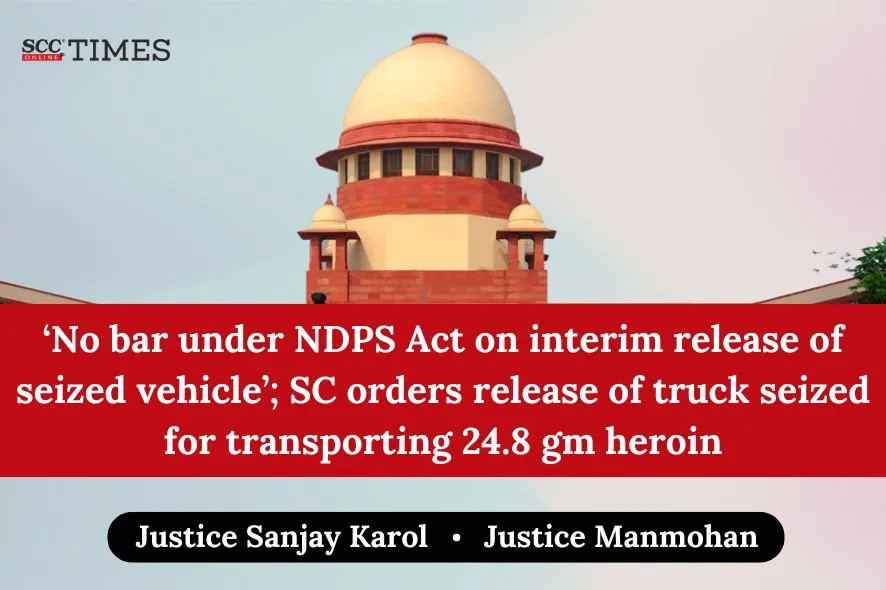Supreme Court: In a criminal appeal against Gauhati High Court’s decision, whereby, the appellant truck owner had sought release of his vehicle which was seized by the police on recovery of heroin after his application was dismissed by Trial Court, the Division Bench of Sanjay Karol and Manmohan, JJ. allowed the appeal and directed the Trial Court to release the vehicle in question in the interim on superdari after preparing a video and still photographs of the vehicle and after obtaining all information/documents necessary for identification of the vehicle, which shall be authenticated by the Investigating Officer, owner of the Vehicle and accused by signing the same. Further, the Court directed that the appellant shall not sell or part with the ownership of the vehicle till conclusion of the trial and shall furnish an undertaking to the Trial Court that he shall surrender the vehicle within one week of being so directed and/or pay the value of the vehicle (determined according to Income Tax law on the date of its release), if so ultimately directed by the Court.
Factual Matrix
The police on search of truck owned by the present accused found 24.08 gms of heroin. The appellant’s case was that as per his driver, the person who boarded the vehicle from Manipur possessed the packed of heroin and neither the truck owner nor his driver was aware that he possessed such a substance. This person was arrested by the police and the chargesheet stated that the heroin was recovered and seized from his possession. The truck owner sought the release of his vehicle which has been lying unattended at the Police Station exposed to sun and rain thereby rendering it to natural wear and tear and deterioration.
Analysis and Decision
Perusing the judgments dealing with similar circumstances, the Court said that there is no general proposition of law and are based on facts of each case. Perusing the provisions of the Narcotic Drugs and Psychotropic Substances Act, 1985, the Court said that the seized vehicles can be confiscated by the Trial Court only on conclusion of the trial when the accused is convicted or acquitted or discharged. However, the Court added that where the Court is of the view that the vehicle is liable for confiscation, it must give an opportunity of hearing to the person who may claim any right to the seized vehicle before passing an order of confiscation. The Court said that the seized vehicle cannot be confiscated if the owner of the seized vehicle can prove that the vehicle was used by the accused person without the owner’s knowledge or connivance and that he had taken all reasonable precautions against such use of the seized vehicle by the accused person.
The Court held that there is no specific bar/restriction under the provisions of the NDPS Act for return of any seized vehicle used for transporting narcotic drug or psychotropic substance in the interim pending disposal of the criminal case. The Court also said that in the absence of any specific bar under the NDPS Act and in view of Section 51 of NDPS Act, the Court can invoke the general power under Sections 451 and 457 of the Code of Criminal Procedure, 1973 (CrPC) or return of the seized vehicle pending the final decision of the criminal case. Consequently, the Trial Court has the discretion to release the vehicle in the interim. However, this power would have to be exercised in accordance with law in the facts and circumstances of each case.
Regarding the construction of the statute which would produce an absurd or unjust result, the Court reiterated that more absurd a suggested conclusion of construction is, the more the Court will lean against that conclusion. In the present context, the Court states that if the respondent-State’s interpretation is accepted, then in a case where an accused is arrested carrying heroin in a private plane or a private bus or a private ship without the knowledge and consent of the management and staff of the private plan or bus or ship, the plane/bus/ship would have to be seized till the trial is over.
The Court agreed that the vehicle is a critical piece of material evidence that may be required for inspection to substantiate the prosecution’s case, however, the said requirement can be met by stipulating conditions while releasing the vehicle in interim order on superdari like videography and still photographs to be authenticated by the Investigating Officer, owner of the vehicle and accused by signing the said inventory as well as by placing a restriction on sale/transfer of the vehicle.
Further, the Corut elaborated that in the scenario where the where the vehicle has been stolen by the accused and contraband is recovered from such stolen vehicle; or where the contraband is seized / recovered from a third-party occupant (with or without consideration) of the vehicle without any allegation by the police that the contraband was stored and transported in the vehicle with the owner’s knowledge and connivance, the owner of the vehicle and/or his agent would not be arrayed as an accused. The Court said that in both these scenarios, where no allegation has been made in the chargesheet against the owner and/or his agent, the vehicle should normally be released in the interim on superdari subject to the owner furnishing a bond that he would produce the vehicle as and when directed by the Court and/or he would pay the value of the vehicle as determined by the Court on the date of the release, if the Court is finally of the opinion that the vehicle needs to be confiscated.
Therefore, in the matter at hand, upon noting that a chargesheet has been filed in the Court of Special Judge, neither the owner of the vehicle nor the driver was arrayed as an accused, and only third-party occupant was arrayed as an accused; and the police after investigation did not find that the appellant allowed his vehicle to transport contraband drugs/ substances with his knowledge or connivance or that he or his agent had not taken all reasonable precautions against such use, the Court held that the vehicle was entitled to be released on superdari.
CASE DETAILS
|
Citation: Appellants : Respondents : |
Advocates who appeared in this case For Petitioner(s): For Respondent(s): |
CORAM :





